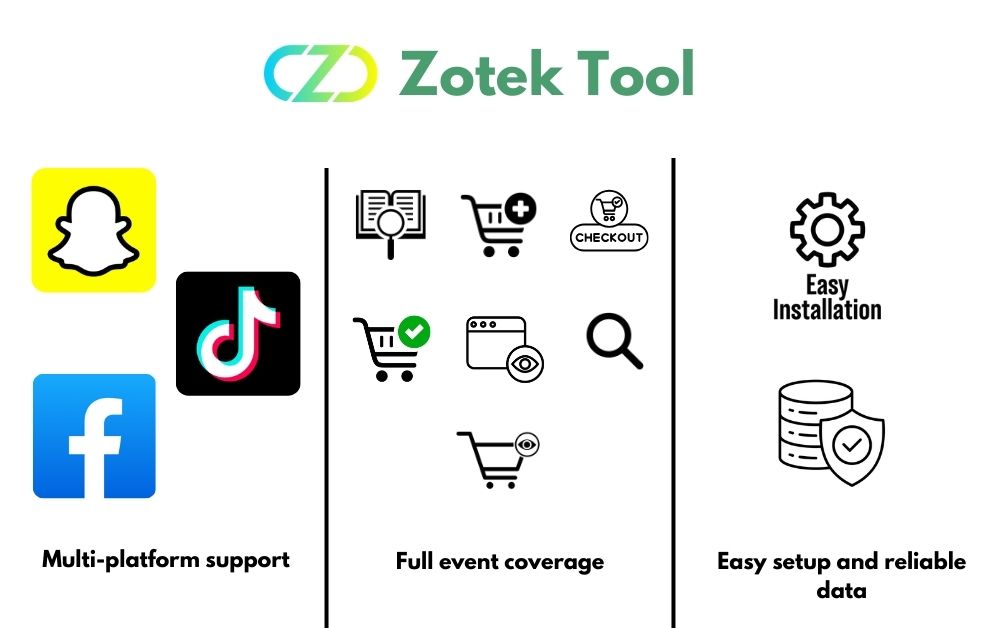
📍 1. Introduction: Why Accurate Tracking Matters in 2025
Since Apple’s iOS 14 update and growing privacy rules, tracking user behavior has become harder for eCommerce advertisers. Facebook Pixel, once a reliable tool for capturing browser events like Add to Cart or Purchase, now faces data loss due to cookie restrictions.
That’s why Facebook Conversions API (CAPI) is a game-changer. It sends event data directly from your server to Meta, ensuring more accurate reporting and better optimization — even when browsers block tracking.
In 2025, success in digital marketing isn’t just about great ads — it’s about accurate data. Understanding how Pixel and CAPI differ (and how to use both together) is key to scaling your Shopify or eCommerce business efficiently.
⚙️ 2. What Is Facebook Pixel?

Facebook Pixel is a small piece of JavaScript code that you install on your website to track user behavior. It collects valuable actions such as:
- 👀 Page Views – when a visitor lands on your website
- 🛒 Add to Cart – when someone adds a product to their shopping cart
- 💳 Initiate Checkout – when users start the checkout process
- ✅ Purchase – when a transaction is completed
This data is sent from the user’s browser to Facebook, allowing advertisers to:
- Measure campaign performance
- Create custom and lookalike audiences
- Optimize ads for higher conversions
🧩 Limitation: The Facebook Pixel depends heavily on browser cookies. With privacy updates and browsers like Safari and Chrome restricting third-party cookies, tracking accuracy has dropped — resulting in missing or incomplete data.
🧠 3. What Is Facebook Conversions API (CAPI)?

Facebook Conversions API (CAPI) is Meta’s powerful solution to modern tracking limitations caused by privacy updates and cookie restrictions.
Unlike the traditional Facebook Pixel, which depends on browser-based data, Conversions API sends user event data directly from your server to Meta’s server — ensuring more reliable and complete tracking.
CAPI can record the same actions as the Pixel — and even more — including:
- 🛒 Add to Cart
- 💳 Purchase
- 📝 Form Submissions
- 🧾 Subscription Sign-ups
- ⚙️ Custom Server Events tailored to your business
✅ Key Benefits of Using Facebook Conversions API:
- Accurate tracking, even when browsers block cookies
- Better attribution across devices and channels
- Greater control over what data is shared with Meta
- Enhanced ad optimization and ROAS (Return on Ad Spend)
By combining Conversions API with Facebook Pixel, advertisers can achieve a full-funnel tracking setup — minimizing data loss and maximizing campaign performance.
⚖️ 4. Key Differences: Facebook Pixel vs. Conversions API
To get the best results from your Facebook ads, it’s important to understand how Facebook Pixel vs Conversions API differ — and how they complement each other.

💡 In short:
- Pixel = browser-based tracking
- CAPI = server-based tracking
They track similar events — like AddToCart, Purchase, or Form Submission — but from different sides of the data process. When combined, they create a hybrid tracking setup that gives you both breadth (Pixel) and accuracy (CAPI) for smarter campaign decisions.
🔗 5. Why You Should Use Both Together
When it comes to Facebook Pixel vs Conversions API, the smartest move isn’t choosing one — it’s combining both.
Meta itself recommends running Pixel and CAPI in parallel for the best performance and tracking accuracy.
Here’s why this dual setup matters:
✅ More Complete Data Capture:
By tracking from both the browser (Pixel) and the server (CAPI), you reduce data loss caused by cookies, ad blockers, or browser restrictions.
📊 Accurate Event Deduplication:
Facebook automatically detects and merges duplicate events, ensuring your reports stay clean and your conversion data remains precise.
🧭 Full-Funnel Visibility:
You get a holistic view of the customer journey — from the first ad impression to checkout and purchase — enabling better ad optimization and smarter budget allocation.
💡 Result:
Running Pixel and CAPI together gives Shopify and WooCommerce merchants more accurate insights, stronger ad performance, and a higher return on ad spend (ROAS).
⚙️ 6. How Tools Like Zotek Simplify Pixel + CAPI Integration
Managing Facebook Pixel vs Conversions API setup manually can be time-consuming — it often requires technical steps like generating Meta tokens, mapping events, and configuring servers.
That’s where tools like Zotek make a real difference. Zotek streamlines the process by offering:
🧩 1-Click CAPI Setup for Shopify — no coding or server configuration needed.
📊 Automatic Event Tracking — including ViewContent, AddToCart, InitiateCheckout, Purchase, and more.
⚡ Real-Time Dashboard Monitoring — see your Pixel and CAPI events in one unified place.
🧠 Pixel Duplication Protection — ensures accurate, clean data without event overlap.

With Zotek, even non-technical merchants can implement professional-grade tracking in minutes — unlocking precise event data, better attribution, and higher ROAS this holiday season.
🎯 7. Final Thoughts
In 2025, accurate tracking isn’t just about collecting data — it’s about staying ahead of the competition. Understanding the difference between Facebook Pixel vs Conversions API gives your brand a clear edge in optimizing ads and improving ROI.
While the Facebook Pixel provides quick insights from browser activity, the Conversions API ensures you never lose valuable event data due to cookie restrictions or privacy updates.
👉 The winning formula? Use both together — and let powerful tools like Zotek manage the complex setup for you.
This way, you’ll enjoy precise analytics, smarter ad performance, and more time to focus on what really matters: scaling your brand with confidence.